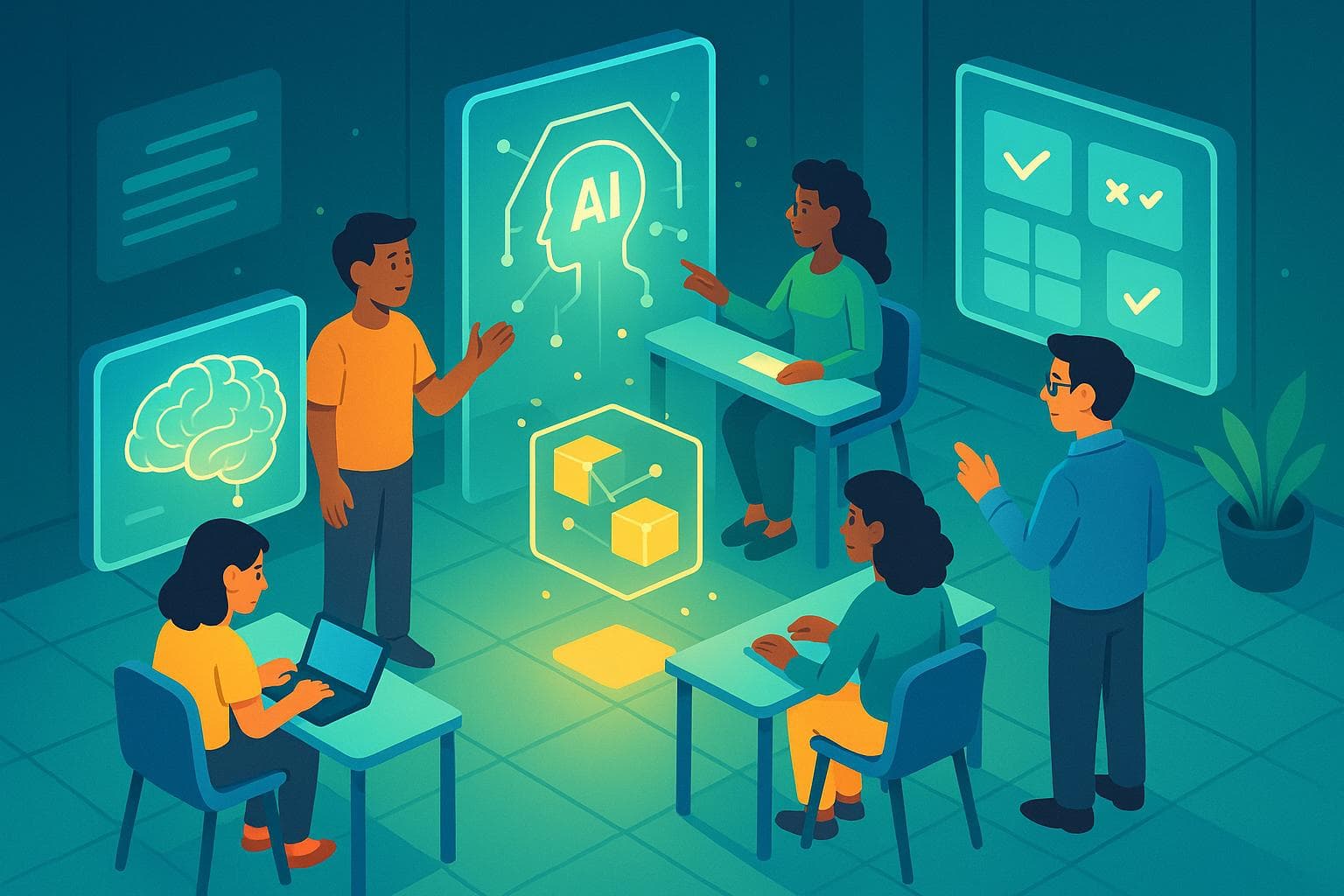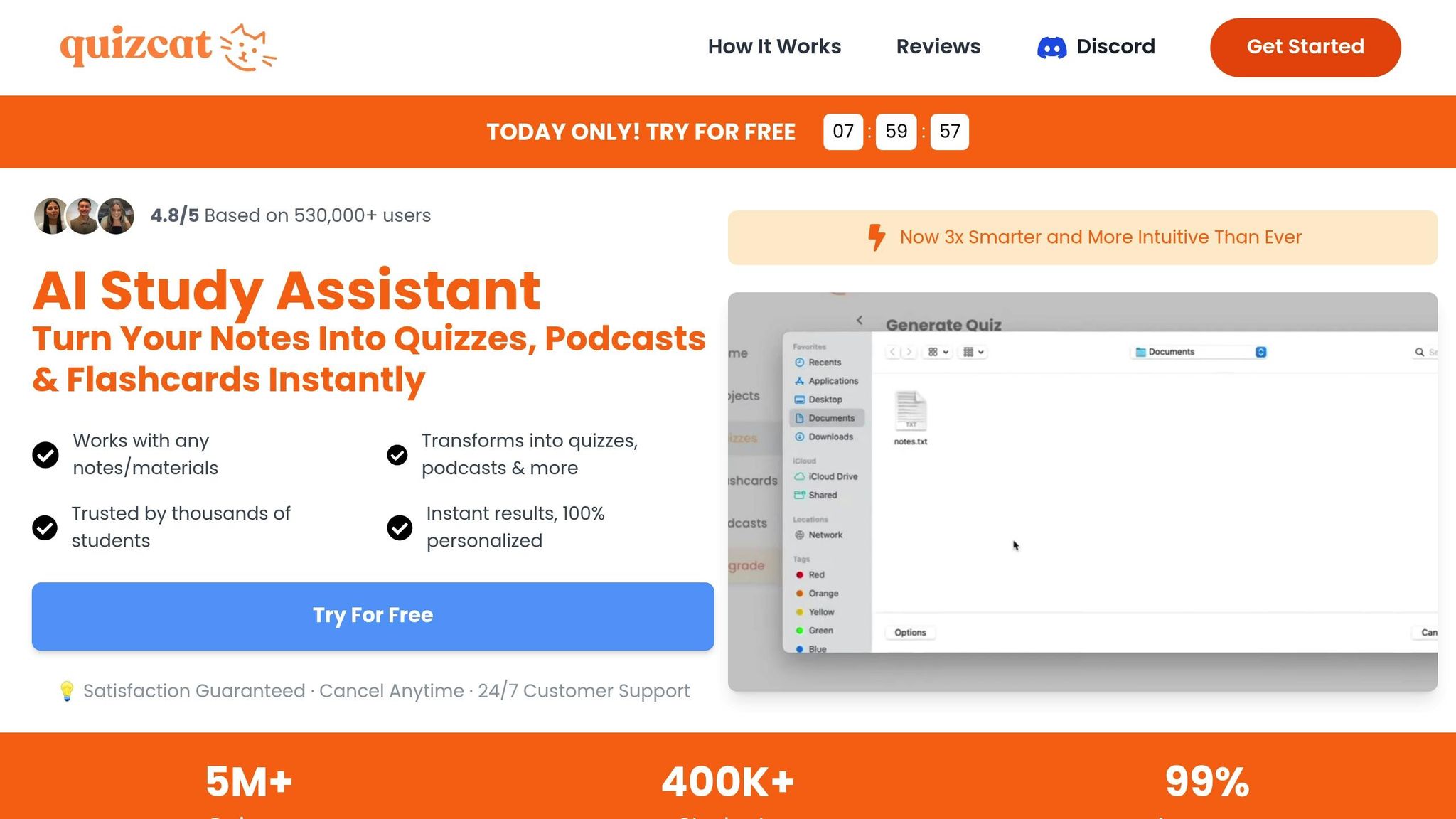
AI Assessments and Cognitive Skill Growth
AI is transforming education by offering instant feedback, personalized study tools, and helping students improve memory, problem-solving, and self-awareness.
Here’s what you need to know:
- AI tools like QuizCat convert notes into quizzes, flashcards, and podcasts with 99% accuracy.
- Students receive real-time feedback, boosting learning efficiency and confidence.
- Features like spaced repetition and adaptive difficulty improve retention and critical thinking.
381: AI in computerized adaptive testing to assess the cognitive performance of students
Cognitive Skills Improved by AI Testing
AI-powered assessment tools are reshaping how students build essential cognitive skills. Studies show that personalized, AI-driven testing can lead to noticeable improvements in memory, problem-solving, and self-awareness. Let’s break down how AI testing contributes to these areas.
Memory Improvement
AI assessments use spaced repetition techniques to help students retain information more effectively. For example, QuizCat AI employs a flashcard system that adapts to each individual's learning speed, presenting material at just the right intervals to maximize retention. It also uses a mix of formats - quizzes, flashcards, and even podcasts - to reinforce learning.
Sophia Martinez shared her experience:
"The quizzes it makes from my notes are so spot-on. My test scores have gone up, and I actually enjoy studying now."
Problem-Solving Skills
Adaptive testing platforms like QuizCat AI tailor questions to challenge students at the right level. With an impressive 99% accuracy and over 5 million quizzes generated, data shows that these tools significantly boost problem-solving abilities.
Learning Self-Awareness
AI tools go beyond traditional assessments by tracking study habits to promote metacognitive awareness. This helps students understand their learning patterns and make adjustments. Chloe Adams shared her thoughts on May 12, 2025:
"The flashcards and quizzes are super accurate, and the podcast feature is next level, allowing me to study while walking my dog."
This kind of flexibility helps students pinpoint their most productive study times and preferred learning methods, deepening their self-awareness and improving their overall approach to studying.
Data-Driven Learning Personalization
AI takes learning personalization to the next level by analyzing data to craft study experiences tailored to each individual. By diving into user performance and learning habits, these systems adapt in real time to meet unique needs.
Smart Difficulty Adjustment
QuizCat AI fine-tunes content difficulty based on how a user performs. This dynamic adjustment ensures students are neither overwhelmed nor under-challenged, directly supporting the cognitive growth mentioned earlier.
Here’s how it works:
- Analyzing response patterns: Identifies how well students are answering questions.
- Spotting knowledge gaps: Pinpoints areas where students struggle.
- Adjusting question complexity: Makes questions easier or harder as needed.
- Offering diverse content formats: Keeps learning engaging with varied materials.
Students often find that this immediate, tailored feedback boosts their study effectiveness. It’s a seamless method that naturally ties into broader progress tracking.
Progress Monitoring
Beyond adjusting difficulty, QuizCat AI excels at tracking progress to refine study plans even further. With over 400,000 active students, the platform uses data to:
- Track performance across different subjects.
- Monitor how well students retain information.
- Identify areas that need extra practice.
- Build personalized study paths for continued improvement.
What really sets QuizCat AI apart is its ability to turn study materials into engaging formats like quizzes, flashcards, and even podcasts. This flexibility allows students to learn in ways that match their preferences. With a 4.8/5 rating from more than 530,000 users, it’s clear that this approach helps students make the most of their study time, zeroing in on areas that need attention.
sbb-itb-1e479da
AI Assessment in Schools
Educational institutions are increasingly turning to AI-powered tools to reshape how students learn and prepare for exams. These systems are changing the game by offering personalized, efficient ways to build essential skills and improve academic performance.
University Test Prep
AI's ability to tailor learning experiences has made it a game-changer for exam preparation. Take QuizCat AI, for example - it has helped over 400,000 students and boasts an impressive 4.8/5 rating from more than 530,000 users. Jake Harrison, a satisfied user, describes it as:
"A personal tutor available 24/7."
What makes QuizCat AI so effective? It takes lecture notes and turns them into quizzes, flashcards, and even audio lessons with 99% accuracy. This means students can access study materials anytime, anywhere. But QuizCat AI isn’t just about acing exams - it’s also about building skills that last a lifetime.
Building Core Competencies
AI assessments are proving to be powerful tools for developing the core skills students need both in school and beyond. QuizCat AI has already created over 5 million quizzes, helping students sharpen their knowledge across a wide range of subjects. Its features are designed to maximize efficiency, as Ethan Blake explains:
"The flashcards are crazy good, but the podcast feature is my fave. It reads my notes back to me while I'm at the gym or driving. Talk about multitasking!"
Key Considerations
As AI becomes more integrated into education, ensuring fair assessments and safeguarding student data are essential steps for protecting both student success and institutional integrity.
Reducing Assessment Bias
Algorithmic bias is a well-documented issue that can disproportionately affect underrepresented groups. For example, some platforms have started using machine learning to analyze millions of assessments to reduce bias. Ensuring assessments are fair is critical for accurately measuring students' cognitive development.
To promote fairness, educational institutions should focus on these strategies:
- Use diverse training datasets that reflect all student demographics.
- Conduct regular audits to identify and address bias in algorithms.
- Keep human oversight as a key part of the evaluation process.
- Treat AI as a tool to assist, not replace, human judgment.
Interestingly, research shows that students aged 17–25 tend to rely heavily on AI tools, often at the expense of critical thinking skills. In contrast, older students, particularly those aged 46 and up, use these tools more selectively and demonstrate stronger independent thinking.
These steps toward reducing bias also set the stage for better handling of sensitive student data.
Student Data Protection
As AI processes increasing amounts of sensitive student information, data security becomes a top priority. To maintain trust in AI-driven educational tools, institutions need to adopt robust protection measures.
| Protection Measure | Implementation Requirement |
|---|---|
| Data Encryption | Ensure all stored student data is encrypted for security. |
| Access Controls | Establish permission levels to limit access based on roles. |
| Retention Policies | Define clear guidelines for how long data is stored. |
| Consent Process | Provide students with transparent explanations of data usage. |
| Regular Audits | Continuously monitor and update security measures. |
For instance, a 2022 pilot program at the University of Southern California used IBM Watson to predict academic outcomes with 85% accuracy. While this demonstrates the potential of AI in education, it also underscores the importance of rigorous data protection practices alongside accurate assessments.
Looking Ahead
AI's Educational Benefits
AI-powered learning tools are reshaping how students develop cognitive skills by offering tailored, data-driven solutions. Here are three standout benefits:
-
Personalized Learning Paths
AI analyzes individual performance patterns to craft study materials that focus on weaker areas while reinforcing strengths. -
Multi-Modal Learning Support
Study materials can be transformed into various formats - like text, audio, or visuals - making it easier for learners with different styles to absorb information effectively. -
Real-Time Progress Tracking
Instant feedback allows students to adjust their strategies and improve results more efficiently.
With these advantages, AI tools are quickly becoming a go-to resource for students looking to refine their learning methods.
Getting Started with QuizCat AI

QuizCat AI takes these advancements a step further, offering a well-rounded platform designed for students aiming to boost their study efficiency.
"I was drowning in notes before I found this tool. Now, it turns everything into flashcards, quizzes, and even podcasts! Studying has never been this easy. 🚀 Highly recommend!" - Emily Carter
To make the most of AI-assisted learning, QuizCat AI provides a variety of study formats:
| Study Format | Best Use Case | Key Benefit |
|---|---|---|
| AI Quizzes | Testing knowledge | Feedback on comprehension |
| Smart Flashcards | Quick reviews | Retain key concepts |
| Podcasts | Learning on the go | Save time effectively |
Students can kick off their AI-enhanced learning experience with a trial week for just $0.99, making advanced tools accessible to all.
As AI continues to advance, tools like QuizCat AI will only get smarter, adapting to unique learning needs while maintaining a strong focus on privacy and fairness. The future of education is all about integrating these intelligent systems to help students achieve their academic goals.
FAQs
How does QuizCat AI create accurate and personalized study materials?
QuizCat AI leverages advanced algorithms to transform your uploaded notes or study materials into custom quizzes and flashcards that suit your learning style. These tools are designed to match your pace and target the areas where you could use extra practice.
By tailoring the content to your study goals, QuizCat AI helps you revisit key ideas, evaluate your understanding, and strengthen your grasp of the material more effectively.
How does QuizCat AI protect student data and ensure privacy during the learning process?
Currently, there’s no detailed information about how QuizCat AI safeguards student data or handles privacy concerns. For accurate and up-to-date details, it’s best to contact QuizCat AI's support team or check their privacy policy directly.
How do AI-driven assessments enhance problem-solving and critical thinking skills in students?
AI-powered assessments employ sophisticated algorithms to tailor questions to a student’s performance, creating a personalized learning journey. By presenting tasks that align with each learner's skill level, these assessments promote greater engagement and help develop critical thinking and problem-solving skills.
Tools like Quizcat AI take this a step further by converting study materials into interactive quizzes and flashcards. These tools enable students to actively review concepts, pinpoint areas where they need improvement, and sharpen their cognitive abilities - all while making the learning process both enjoyable and effective.
